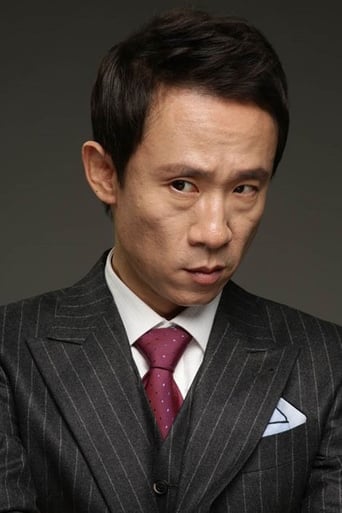Intcatinfo
A Masterpiece!
CrawlerChunky
In truth, there is barely enough story here to make a film.
Zlatica
One of the worst ways to make a cult movie is to set out to make a cult movie.
Kinley
This movie feels like it was made purely to piss off people who want good shows
cephalocereus
This movie is a portrait of human beings. There are no "the good ones" and "the bad ones". The characters are victims of their circumstances. The problem I saw in this movie was: there are so many stories that after 80 or 90 minutes the film becomes tedious and artificial. Every single story has a dramatic end. There are so many screams, cryings and dramas that it begins to be artificial. Although I know in war is impossible to have a big smile in the face; in this case is a drama after drama within a whole drama. Thus the movie loses its effectiveness. I think the movie must show more clearly the main story and use two or three stories, as maximum, to support it. I have seen better movies of Kim Ki Duk, that's why I rate this one with a 6.
fetboy
A very well made movie, and beautifully acted, but an American viewer will definitely take offense to it (especially if they are, or have been, a US serviceman). I have been searching for a good Korean movie or TV show that would give insights as to how the South Koreans feel about the American presence in their country, but surprisingly that topic is almost never brought up in Korean made entertainment. I read the cover of "Address Unknown" in the video store, and thought this would be a good movie about the Americans in South Korea. It is a good movie, but I was offended. The movie focused of several stereotypes that I found appalling (I will try to write this review without giving away too much movie in details, but be aware there are spoilers in this review).The movie's main characters are a horribly poor, mentally disturbed, Korean woman and her mixed racial son that was the issue of an African American airman. In the viewer's first introduction to this couple, we the viewer see the son attempt to brutalize his mother. The message was obvious; The Korean mothers of children of American servicemen live desperate lives, and their mixed racial children resent them.Having spent 6 years in Japan in the US navy, and being the father of 2 Japanese American Children you can probably understand why I would be offended by this notion.Matters may have been different in the 60s and 70s, but I can say from personal experience that every child of an Asian mother and American serviceman that I know has benefited greatly from being truly bi-lingual, and have lived well in their respective countries (I have been searching for information on the actor/rap singer Dong-kun Yang to see if he actually is half African American, but if he's not, he still spoke English beautifully in the movie). The relationship between the mother and her bi-racial son takes a terrible turn, when the son slicing off his mother's breast tattoo that depicts her former, American serviceman, lover's name. The mother throughout the movie takes pride in her son and her past love with the American serviceman, and to me these were the only touching aspects of the movie. To see the son attack his mother in this way really made my heart sink and I could not understand what point the director was trying to make, other to characterize bi-racial children negatively.The breast tattoo topic comes up again when an AWOL American soldier attempt to carve his name into the breast of his Korean lover, so that she will never forget him after he is gone. I have been searching on the web, and I cannot find any account of such an occurrence happening, in the long US-Korean relations, involving a serviceman carving his name into a Korean woman (or girl) against her will. Where that stereotype of an American wanting to tattoo a Korean woman came from, I have no idea, though it does sound a lot like what KKK members are reported to have done in the States. In any case I thought it was a very unfair portrayal or Americans, and it reminded me a lot of the myth of Vietnamese women who hid razor blades in their vaginas (might have happened, but I highly doubt it, and there is no report of it actually having happening).Early in the film we see this same serviceman offer that same Korean girl a chance at eye surgery in trade for her becoming his sweetheart. Anyone who knows anything about the US military knows that such an exchange is absurd, because a serviceman could only get surgery for a Korean woman if she was his wife. The message that that exchange attempts to give, which becomes more clear later, is that Korean women (and Koreans in general) are forced to yield to everything Americans demand (no matter how demeaning), because Americans feel that the Koreans owe them so much after all the Americans have done for them. Later the girl blinds her surgically repaired eye, giving the message that her deranged American lover's gift was not welcomed after all.I hope that Koreans who have watched (or plan to watch) "Address Unknown" will not assume that all American servicemen are deranged, because were not, or that we intend to make outrageous demands of them after all of the "gifts that we have given them," because we do not.The tone of "Address Unknown" borders on anti-American propaganda, which is really a shame because this movie is very well made.I hope someday there will be a less grim movie made about the post war Korean-American experience, because I know from personal experience that most interpersonal Korean-American relationships are not all bad (though in the 60s and 70s, relationships between Koreans and Americans were probably a lot more strained).
Michael Cumming
Not unlike the Oscar Wilde play from which my "One Line Summary" for this comment is co-opted the director of `Address Unknown' requires his audience to think. In all of the Kim Ki-duk films I have seen (The Isle, Address Unknown, Bad Guy) what lies on the surface differs greatly from what lies beneath it. He is working in a language of metaphor and allegory with characters that range from caricature to archetype to fodder. By fodder I mean they are impenetrable and near impossible to empathize/sympathize with for the sole reason that emotional attachment is not the director's intention. He is creating a fictional world made to comment on the world we live in.By exploring the eclectic residents of an isolated South Korean village in close proximity to an American military base Ki-duk is dealing with a number of issues such as globalization (the base, the bullies who moved to America), language (the theme of English, the comic interlude of the Playboy translation), gender (obvious), race (obvious), history (that family whose father turned out to be a traitor, the constant references to the past from the veterans), tradition (the archery), relationships (Korean girl and U.S. solider), war (obvious) and violence (obvious). The bleak, violent, at times repulsive world the film takes place in is so over-the-top that the audience can't help but think that it is just a means to an end.In films like `The Isle' and `The Bad Guy' the black humour and sarcasm are more evident. `Address Unknown' is a tad more subtle but there are more than enough hints to indicate the film should not be taken at face value. An excellent example is the constant, almost laughable violence.Kim Ki-duk is one of a handful of directors striving to create intelligent cinema that is accessible as well. The East is bursting at the seams with talent and I really hope it starts to get the recognition it deserves.
sippan
I love this movie! OK, it's horrible, it's disgusting, watching it mademe sick...and saying that I experienced physical pain is not a lie.There is no happiness in this film. Everyone is depressed andeveryone has difficult problems to deal with, and those problemsdon't get solved, but rather get worse during the film. But this iswhy I love it! A film that can give you such strong feelings, even ifthe strong feelings are depression and pain, is a GOOD film!Might be good to see this if you think YOU have problems. =)




